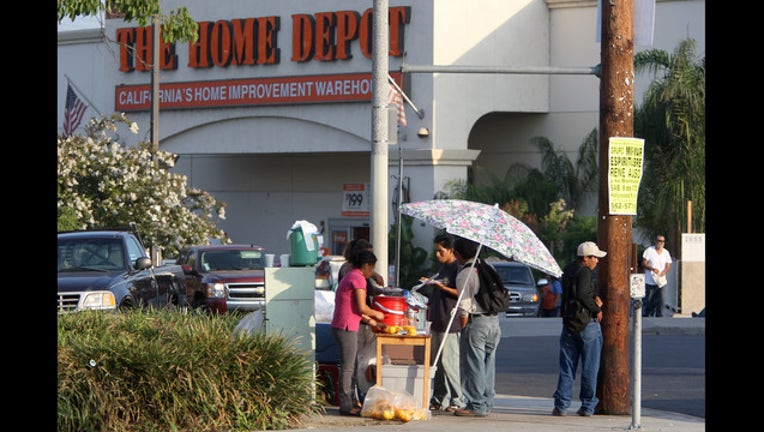New California law to help sidewalk vendors operate legally

FILE ART- A curbside vender sells food to day laborers waiting near a Home Depot home improvement store in hope of finding work. (Photo by David McNew/Getty Images)
SACRAMENTO, Calif. (AP) - California Gov. Jerry Brown has signed a bill to make it easier for sidewalk vendors to operate legally in the state.
It's one of dozens of bills Brown announced signing Monday, including measures to help voters ensure their mail ballots are counted and standardize balcony inspections.
The new sidewalk vending law will let cities and counties create permit programs for vendors and limits when they can be criminally prosecuted.
"We can start seeing sidewalk vendors for who they are - women and seniors, single parents, and micro-business owners taking that first step to starting their own business," said Sen. Ricardo Lara, the Bell Gardens Democrat who authored the bill, SB946. "Gov. Brown's signature validates that thousands of sidewalk vendors are an important part of our economy."
Sidewalk vendors, who typically sell food or other goods, can be required to hold business licenses and pay taxes under the law. Cities and counties can also establish health and safety policies for vendors.
Lara says he introduced the legislation after hearing stories about sidewalk vendors being harassed and arrested. His office pointed to an incident where a woman selling corn on a sidewalk in Rancho Cucamonga was detained by Immigrations and Customs Enforcement and later released by an immigration judge.
Immigrant rights advocates cheered the move. In a joint statement on Monday, Gina Da Silva, the government affairs director of the California Immigrant Policy Center in San Francisco, said: "No one should be criminalized for trying to make a living or excluded from basic opportunities due to the federal government’s failure to create a workable immigration process.
"As Californians continue to grapple with growing economic inequality, these new laws are part of a broader agenda to expand economic opportunity and increase protections for all workers, including immigrants. By removing key barriers to opportunity, these new laws will allow more cultural innovation to flourish within our economy, enhance local and state revenue, and elevate California’s competitiveness."
The other bills Brown announced signing Monday include:
-SB759 requires counties tell voters if the signature on their ballot envelope doesn't match the one on file and give them an opportunity to fix it. It aims to ensure votes are counted even if voters' signatures have changed since they registered. It takes effect immediately, in time for the November election.
-AB2218 creates a system that by 2020 will let voters track their ballot through the mail. The system will notify voters once their ballots have been counted and send reminders to those who haven't yet mailed theirs.
-SB721 standardizes balcony inspections at apartment buildings after the collapse of a balcony at a Berkeley apartment building in June 2015 that killed six college students, most of them from Ireland. It will require that inspectors check the waterproofing on decks and balconies of all buildings with three or more multifamily units by January 2025 and then again every six years.

